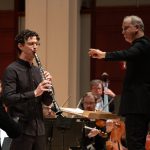Houston Grand Opera. Houston Grand Opera Orchestra, Kwamé Ryan, conductor; Jawole Willa Jo Zollar, director & choreographer; Jake Heggie, composer; Gene Scheer, librettist. Cast: Janai Brugger (Mary Jane Bowser), Jamie Barton (Elizabeth Van Lew), J’Nai Bridges (Lucinda), Caitlin Lynch (CallieVan Lew), Michael Mayes (Travis Briggs), Nicholas Newton (Henry), Joshua Blue (Wilson), Urban Bush Women Dancers. Aulbum team: Monica Thakkar, executive producer; Blanton Alspaugh (Soundmirror, Inc.), producer; Mark Donahue, recording/mixinmg/mastering engineer; Jacob Steingart, wireless engineer; Soundmirror, Inc., audio recording and post-production; Chelsea Crouse, packaging designer.
Jake HEGGIE & Gene SCHEER: Intelligence
Houston Grand Opera HGO0001
Formats: CD, Digital
Release Date: August 29, 2025
Total Duration: 02:15:24
Giorgio Koukl | 7 JUL 2025
Jake Heggie’s latest opera, Intelligence, with a libretto by Gene Scheer, premiered in October 2023 at Houston Grand Opera. It will soon be released on the LSO label as the first of a series planned for the future by Houston Grand Opera. This is certainly good news, as with better international distribution, many US composers who have been virtually unknown here in Europe will be brought to the attention of the general public.
Being Heggie’s 10th full-length opera, with some significant operas from the past, like Dead Man Walking, Moby Dick, and It’s a Wonderful Life, it’s undoubtedly time to delve deeper into the compositional capacities of this author.
What strikes immediately is the extraordinary capacity of Heggie to write pleasant, immediately recognizable tunes well underlined by a sapient orchestration and mostly well written for the voice. That might not be the kind of contemporary opera we are accustomed to in Europe (await no Stockhausen, no Berio), but it is fun and surely an immediate pleaser for the general public.
Based on a historical true story, the two main characters are an enslaved Black woman with an extraordinary memory who infiltrates Jefferson Davis’ Confederate White House. Her name is Mary Jane Bowser, here sung by the excellent Janai Brugger, and a white Southern aristocrat lady secretly aiding the Union, named Elizabeth Van Lew, sung by the equally marvelous Jamie Barton.
Generally speaking, the entire story, a real spy thriller with danger, high-risk situations, and a surprising finale, revolves around these two women.
It is also true that the minor characters are well-designed to be powerful, mean when necessary, and, as a Puccini opera teaches us, many of them die dramatically.
There must be a special mention for Lucinda, a somehow mysterious presence, sung by J’Nai Bridges with a silky and seductive voice.
The orchestra is extremely well-conducted by Kwamè Ryan; its sound is captured in a very natural way, never covering the voices, and is well-balanced between the different sections. Here, the sound engineers did an excellent job, as this is typically a sore point in capturing such a complicated affair like an opera production on stage.
As a natural part of such a large project, some dancing sequences are incorporated in the form of colorful spirits, underscoring the semi-mythological atmosphere. Since a chous is entirely missing, this is fully justified, even if it is sometimes a hint too long for the overall dramaturgy.
What can be said about the musical qualities of the score: It is deeply rooted in a tradition, somewhat resembling a world of Benjamin Britten; its harmonies, despite occasional use of percussion, remain non-experimental.
The difficulty for the interpreters is to obtain a more nuanced shading and avoid the excess of pathos and drama, which is literally dripping out of every line.
It would be great to have some more relaxed passages, but this might be a matter of the composer’s will and choice.
So, the typical characterization of the whole opera is perfectly expressed in the last scene of Act 1, called “Fire”: everything explodes, everything bursts, and the singers are brought into their highest registers. Quite impressive.
We can surely expect more from Jake Heggie in the future, hopefully also in the major European opera houses, such as Paris or Milan. ■
EXTERNAL LINKS:
- Houston Grand Opera: houstongrandopera.org
- Jake Heggie: jakeheggie.com
- Gene Scheer: genescheer.com
- Kwamé Ryan: kwameryan.com
- Jawole Willa Jo Zollar: urbanbushwomen.org/the-founder
- Janai Brugger: janaibrugger.com
- Jamie Barton: jamiebartonmezzo.com
- J’Nai Bridges: jnaibridges.com

Read more by Giorgio Koukl.
RECENT POSTS
 Tine Thing Helseth brings fire and finesse to trumpet concertos by Arutiunian, Penderecki, and Weinberg • 24 Oct 2025
Tine Thing Helseth brings fire and finesse to trumpet concertos by Arutiunian, Penderecki, and Weinberg • 24 Oct 2025 Camerata Nordica Octet brings Scandinavian color and classical clarity to Hodgson Hall • 21 Oct 2025
Camerata Nordica Octet brings Scandinavian color and classical clarity to Hodgson Hall • 21 Oct 2025





.png)